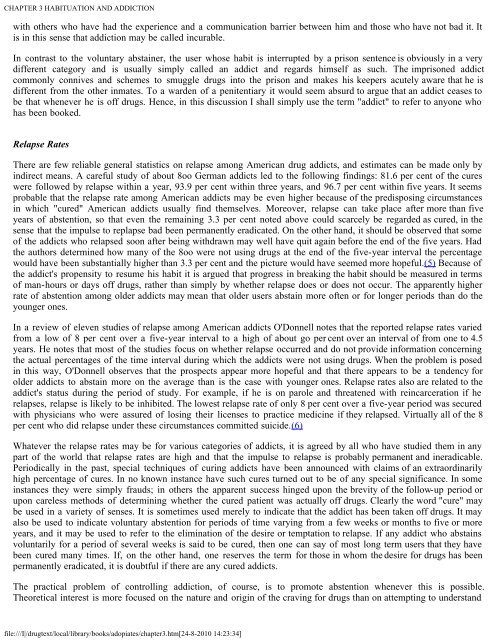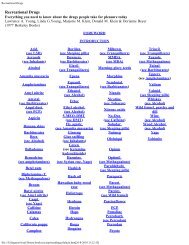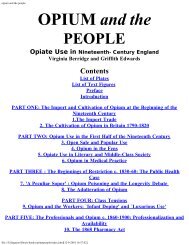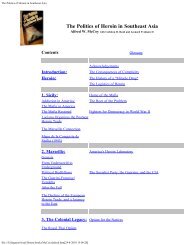Addiction and Opiates
Addiction and Opiates
Addiction and Opiates
Create successful ePaper yourself
Turn your PDF publications into a flip-book with our unique Google optimized e-Paper software.
CHAPTER 3 HABITUATION AND ADDICTION<br />
with others who have had the experience <strong>and</strong> a communication barrier between him <strong>and</strong> those who have not bad it. It<br />
is in this sense that addiction may be called incurable.<br />
In contrast to the voluntary abstainer, the user whose habit is interrupted by a prison sentence is obviously in a very<br />
different category <strong>and</strong> is usually simply called an addict <strong>and</strong> regards himself as such. The imprisoned addict<br />
commonly connives <strong>and</strong> schemes to smuggle drugs into the prison <strong>and</strong> makes his keepers acutely aware that he is<br />
different from the other inmates. To a warden of a penitentiary it would seem absurd to argue that an addict ceases to<br />
be that whenever he is off drugs. Hence, in this discussion I shall simply use the term "addict" to refer to anyone who<br />
has been booked.<br />
Relapse Rates<br />
There are few reliable general statistics on relapse among American drug addicts, <strong>and</strong> estimates can be made only by<br />
indirect means. A careful study of about 8oo German addicts led to the following findings: 81.6 per cent of the cures<br />
were followed by relapse within a year, 93.9 per cent within three years, <strong>and</strong> 96.7 per cent within five years. It seems<br />
probable that the relapse rate among American addicts may be even higher because of the predisposing circumstances<br />
in which "cured" American addicts usually find themselves. Moreover, relapse can take place after more than five<br />
years of abstention, so that even the remaining 3.3 per cent noted above could scarcely be regarded as cured, in the<br />
sense that the impulse to replapse bad been permanently eradicated. On the other h<strong>and</strong>, it should be observed that some<br />
of the addicts who relapsed soon after being withdrawn may well have quit again before the end of the five years. Had<br />
the authors determined how many of the 8oo were not using drugs at the end of the five-year interval the percentage<br />
would have been substantially higher than 3.3 per cent <strong>and</strong> the picture would have seemed more hopeful.(5) Because of<br />
the addict's propensity to resume his habit it is argued that progress in breaking the habit should be measured in terms<br />
of man-hours or days off drugs, rather than simply by whether relapse does or does not occur. The apparently higher<br />
rate of abstention among older addicts may mean that older users abstain more often or for longer periods than do the<br />
younger ones.<br />
In a review of eleven studies of relapse among American addicts O'Donnell notes that the reported relapse rates varied<br />
from a low of 8 per cent over a five-year interval to a high of about go per cent over an interval of from one to 4.5<br />
years. He notes that most of the studies focus on whether relapse occurred <strong>and</strong> do not provide information concerning<br />
the actual percentages of the time interval during which the addicts were not using drugs. When the problem is posed<br />
in this way, O'Donnell observes that the prospects appear more hopeful <strong>and</strong> that there appears to be a tendency for<br />
older addicts to abstain more on the average than is the case with younger ones. Relapse rates also are related to the<br />
addict's status during the period of study. For example, if he is on parole <strong>and</strong> threatened with reincarceration if he<br />
relapses, relapse is likely to be inhibited. The lowest relapse rate of only 8 per cent over a five-year period was secured<br />
with physicians who were assured of losing their licenses to practice medicine if they relapsed. Virtually all of the 8<br />
per cent who did relapse under these circumstances committed suicide.(6)<br />
Whatever the relapse rates may be for various categories of addicts, it is agreed by all who have studied them in any<br />
part of the world that relapse rates are high <strong>and</strong> that the impulse to relapse is probably permanent <strong>and</strong> ineradicable.<br />
Periodically in the past, special techniques of curing addicts have been announced with claims of an extraordinarily<br />
high percentage of cures. In no known instance have such cures turned out to be of any special significance. In some<br />
instances they were simply frauds; in others the apparent success hinged upon the brevity of the follow-up period or<br />
upon careless methods of determining whether the cured patient was actually off drugs. Clearly the word "cure" may<br />
be used in a variety of senses. It is sometimes used merely to indicate that the addict has been taken off drugs. It may<br />
also be used to indicate voluntary abstention for periods of time varying from a few weeks or months to five or more<br />
years, <strong>and</strong> it may be used to refer to the elimination of the desire or temptation to relapse. If any addict who abstains<br />
voluntarily for a period of several weeks is said to be cured, then one can say of most long term users that they have<br />
been cured many times. If, on the other h<strong>and</strong>, one reserves the term for those in whom the desire for drugs has been<br />
permanently eradicated, it is doubtful if there are any cured addicts.<br />
The practical problem of controlling addiction, of course, is to promote abstention whenever this is possible.<br />
Theoretical interest is more focused on the nature <strong>and</strong> origin of the craving for drugs than on attempting to underst<strong>and</strong><br />
file:///I|/drugtext/local/library/books/adopiates/chapter3.htm[24-8-2010 14:23:34]





